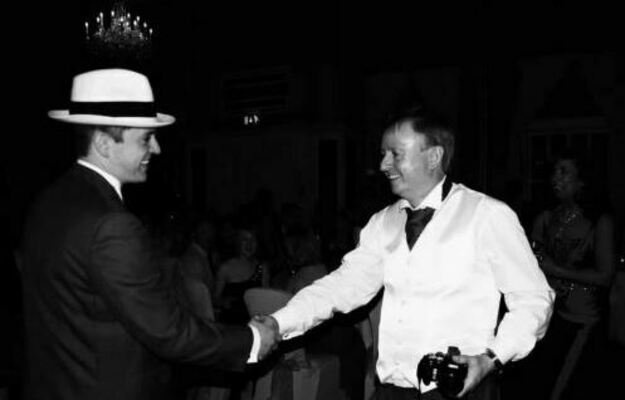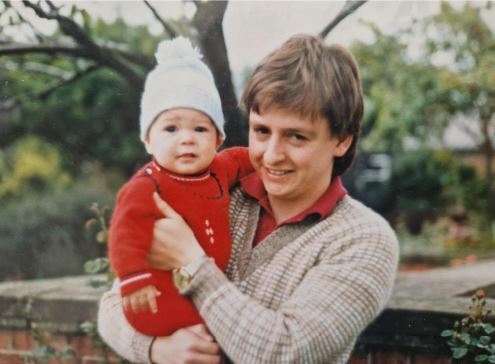My dad, the alcoholic

This is me and my dad on my wedding day. It was, naturally, one of the happiest days of my life.
Around that time, he was several months sober. Not out of choice but necessity, after suffering from pancreatitis brought on by long-term heavy drinking.
It was the only time in my life where Dad was teetotal and this photo captures a moment I’ll cherish forever. Sobriety was only temporary, however, and he slipped back into addiction not long after.
Dad was a good dad - fiercely protective of his family with a good sense of humour - and he raised me and my siblings well. We never went without and I have endless memories of the sweet things he did for us, the kindness, the funny moments. I remember happy times - long summers spent at our static caravan in Yorkshire; trips to the beach, theme parks and cinemas and happy holidays; birthdays and Christmases. He loved us and we loved him.
Throughout it all, Dad was addicted to alcohol.
He was what you might call a functioning alcoholic and was an engineer, something he was very proud of. Brought up in a rough, deprived local authority estate in Sunderland, he’d trained at the local poly and qualified as an engineer draftsman in the 1970s. He’d go to work in the day and drink in the evenings.
As a kid, I remember asking him why he drank. He told me he needed it to get to sleep. I didn’t understand but accepted it to be true.
"As a kid, his drinking just seemed normal. Then you come to understand, it isn't"
Most evenings he would claim to be popping to the shop but would go to the local pub. There were countless mornings I would come down to get ready for school and Dad would be in his chair, passed out with a drained bottle of Clam Dew or sherry by his side.
Come the weekends, he’d be off to the pub with his brother. My uncle, a single man with mild cerebral palsy, was a sweet, mild-mannered man and Dad was very protective of him. But he was an even heavier drinker than my dad, having little responsibility, no kids and, for much of his adult life, no job.
Saturday nights Dad would go to the pub with my mother. On Sundays, as was quite normal for a lot of folks back then, he’d go for a couple of pints before lunch, then go back to the pub. Many Mondays he would call in sick to work, too hungover to get out of bed. We never understood how he kept his job. But even on those days he would muster the energy to go to the pub.
He once worked at a brewery in his capacity as a piping engineer (could there be a less appropriate place to work?) When work was quiet he was allowed to help himself to booze and mum later told me he would come home drunk often, having driven himself home. On one occasion, he was caught drink driving and rightfully banned.
As a kid, his drinking seemed normal to me as I didn’t know any different. But, as you get older, you come to understand that it isn’t.

Among the many happy childhood memories there are occasions I’d like to forget.
Occasions where Dad said or did something that caused hurt to us, the immediate or wider family. We always forgave him, of course, that’s what families are for. I hasten to add he was never physically abusive.
As children do, me and my siblings grew up. I got married in 2011 and soon after my wife became pregnant. My own grandfather (Dad’s Dad) had died when I was a toddler - ironically, a teetotal fitness enthusiast, he had a heart attack while bench pressing. I remember telling my dad I had no memory of having a grandad but really wanted my kids to have one, and pleaded with him to do something about his drinking. He just laughed at me and thought I was being overly dramatic. He always claimed his drinking was under control and he wasn’t going to die.
I still held some naïve hope that grandchildren might change his behaviour but it didn’t. It pains me to say but he didn’t have a close relationship with my kids - he loved them, but always prioritized alcohol.
Mam would come to babysit or just visit, but Dad would take the opportunity to sneak off to the pub. My wife, understandably, didn’t trust him to look after the kids alone after one occasion where he’d taken them to his local in the car with no car seats and drove them home afterwards. When my daughter, aged about 7, told us all about her day with Grandad, my normally placid wife went ballistic and gave him both barrels. Dad initially played it down, but later apologised.
The day my son was born, dad was too drunk to come and meet him. My mum, who didn’t drive and was reliant on him for transport, had to get a train to visit her new grandson. She was furious; Dad just went back to the pub.
"I can't tell you how frustrating it is to watch someone self-destruct and be helpless to stop it."
I hadn’t really appreciated the toll Dad’s drinking took on my mum over the years. When me and my siblings had grown up and moved out, Dad had fewer responsibilities so drank more and more. Mam was unhappy for many years and eventually left him. I wasn’t surprised and, while I supported her, I was worried it meant Dad would spiral - and I was right.
Dad was depressed. He loved my mother and, without her to curtail his behaviour, he drank even more heavily. He wanted her back but couldn’t/ wouldn’t stop drinking. I encouraged him to attend AA meetings and he did once or twice, but it was more an attempt to persuade my mum he was a changed man.
Around that time my uncle developed liver cirrhosis. I visited him in hospital, a shadow of his former self, skin tinged yellow. “Son, you’ve got to tell your dad to stop drinking,” he pleaded. I explained I had been trying for years but nothing would stop him.
My uncle died shortly afterwards. His addiction meant he couldn’t stop drinking, despite being told it would kill him. His death hit Dad hard. You might think it would stop dad’s drinking, but it only made things worse.
At work, he had a new manager, a young highly motivated individual who Dad said was gunning for him for no reason. I suspected there was good reason, not least the countless sick days. Eventually Dad was told to retire or be retired. He’d been so proud of his career and it really knocked his confidence. With abundant free time, a pension and wounded pride, he dealt with this in the only way he knew how.
I can’t tell you how frustrating it is to watch someone self-destruct in front of your eyes and be helpless to stop it. The times I tried to help - come for dinner, hang out, try new hobbies, go places, anywhere other than the pub. At one point I offered to give up alcohol with him. But there is nothing you can do to help an addict who doesn’t want to give up their addiction.
As a family we knew where this would end, despite the warnings and the pleading.
In 2019, Dad was diagnosed with bladder cancer. I took him to one appointment where the consultant talked about surgery if the swelling on Dad’s abdomen went down. It turned out Dad had been previously told he had liver cirrhosis but hadn’t told us, and hadn’t stopped drinking.
"I miss my dad every day."
He underwent treatment for cancer during Covid. I was at home, working and home schooling, while my wife, a psychologist, was seconded to Covid wards. I was worried about everyone, all the stresses people felt at that time, and begged Dad to stay home and be careful but he didn’t care, returning to the pub as soon as it was open and telling me it was his body, he’d do what he liked!
Despite his poor health, with the miracle of modern medicine, he beat cancer, but his health deteriorated rapidly and he looked much older than a man in his 60s, becoming increasingly frail and ending up in hospital several times.
Eventually, doctors said Dad’s kidneys had failed - a direct result of the liver damage. Then one morning in hospital, despite a jovial call to my mother (they had remained close, despite their separation) dad suffered a sudden heart attack and attempts to resuscitate him had failed.
I read the eulogy at my dad’s funeral, which was very well attended. He was loved by many.
I’ll never know what led to Dad’s heavy drinking. I know that after my grandad died, he felt the weight of caring for his disabled brother and widowed mum, as well as us. I know he struggled with anxiety, although he never talked about his mental health. Alcohol was his coping mechanism and alcohol makes anxiety worse.
I miss my dad every day. I loved him, and feel guilty for having put this down in words. He was a good dad, despite his addiction and despite what you’ve just read.
It’s because of Dad that I’m a surveyor when I was asked, aged 18, if I was interested in a trainee surveyor role. I had no idea what one was, but Dad bought me a suit, lent me his tie and briefcase and sat in the car while I was in my interview. He was proud of me, my brother and sister, and told us on many occasions (and all his mates at the pub!)
I still mourn for him and all he has missed out on - my brother’s wedding, the birth of two of his granddaughters, the relationship he never really had with my kids.
I’m no moral authority on drinking and I enjoy alcohol, as anyone who knows me will know. But experience has taught me to restrict it to one night a week as I am extremely conscious of the risk of addiction and the impact it can have on your family.
I write this story during Alcohol Awareness Week to explain the impact alcohol has had on my life and the irreparable damage and heartache it can cause. Alcohol cost my dad so much, from his brother, to his marriage, his job and ultimately his life.
If you or a family member if suffering from alcohol addiction and you would like to talk to somebody, please call LionHeart.
Based in the north east of England, Adrian Drummond MRICS is training manager and area surveyor for SDL Surveying, one of LionHeart's corporate partners. As well as leading on the training for SDL's graduate surveyors he is also an assessor for Sava and the RICS APC. A version of this story was first written for LinkedIn during Alcohol Awareness Week.
Find out more:
- Read more about how LionHeart can help with alcohol dependency, including counselling and CBT, here
- Read Adrian’s other blog, Things you must do as a final year surveying student
- Contact LionHeart for support here

